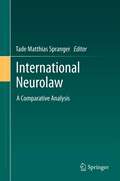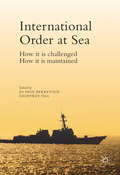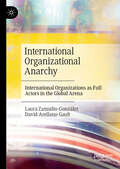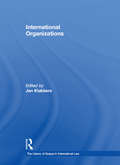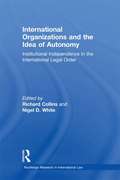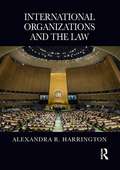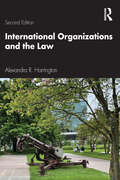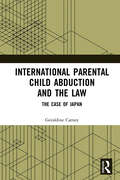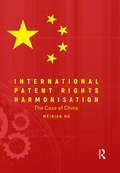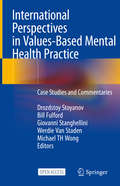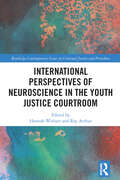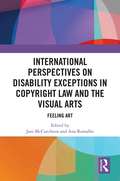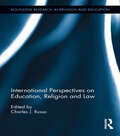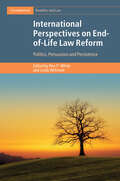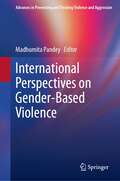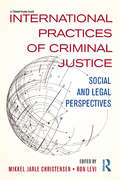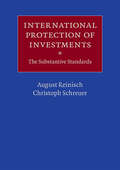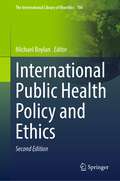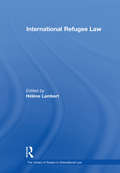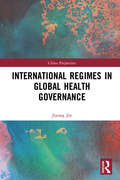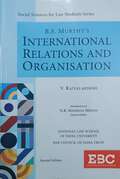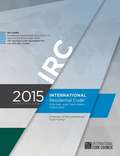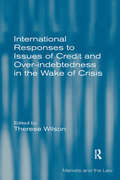- Table View
- List View
International Neurolaw
by Tade Matthias SprangerWhereas the past few years have repeatedly been referred to as the "era of biotechnology", most recently the impression has emerged that at least the same degree of attention is being paid to the latest developments in the field of neurosciences. It has now become nearly impossible to maintain an overview of the number of research projects dealing with the functionality of the brain - for example concerning its organizational structure - or projects dealing with the topics of legal responsibility, brain-computer interface applications, neuromarketing, lie detection or mind reading. These procedures are connected to a number of legal questions concerning the framework conditions of research projects as well as the right approach to the findings generated. Given the primary importance of the topic for the latest developments, it is essential to compare the different legal systems and strategies that they offer for dealing with these legal implications. Therefore, the book International Neurolaw - A Comparative Analysis contains several country reports from around the world, as well as those of international organizations such as UNESCO, in order to show the different legal approaches to the topic and possible interactions.
International Order at Sea
by Geoffrey Till Jo Inge BekkevoldThis book examines how international order at sea is challenged, changed and maintained. The book surveys challenges to the international order at sea in the Asia-Pacific, the Indian Ocean Region, the Atlantic Ocean and the Arctic Ocean. It explores the interaction between and cooperation among leading, emerging and smaller naval powers, both naval and coastguard responses, required for the maintenance of good order at sea. Six broad and interlinked issues are identified that will influence the future international order at sea: the balance between the maritime and the continental domains; the balance between great power rivalry and cooperation; the contest between access and denial; the operational balance between preparing; building and training for warfighting as opposed to operations other than war; how to manage 'disorder' security challenges that very often transcends territorial waters and national boundaries, and finally, the balance between safeguarding national interests and contributing to collective efforts preserving the international order at sea.
International Organizational Anarchy: International Organizations as Full Actors in the Global Arena
by David Arellano-Gault Laura Zamudio-GonzálezInternational organizations are central actors on the global stage, yet their very existence is deeply shaped by their organizational nature. As entities with histories and environments, they navigate complex networks of members and stakeholders—often pursuing conflicting objectives. These organizations must operate, decide, and act amidst unforeseen events and challenges. Far from being abstract entities, international organizations embody all the complexities of organizations in the fullest sense. To survive, they must contend with anarchy: not only within the international system but also within their own structures and decision-making processes. Bridging the gap between Organization Theory and International Relations offers a promising avenue for building the concepts and case studies necessary to understand how organizational anarchy contributes to the creation of international order.
International Organizations (The Library of Essays in International Law)
by Jan KlabbersInternational organizations have come to occupy a central position in international governance, exercising many public functions and facilitating political debate amongst states and other actors, though it is only recently that the focus of legal discussions has begun to shift to controlling the activities of organizations. This volume assembles sixteen important essays addressing various issues relating to the law of international organizations, highlighting theoretical issues and ongoing political debates and emphasizing issues of control. The introductory essay provides an overview of the development of the politico-legal debate and situates the law of international organizations historically and in its contemporary context.
International Organizations and the Idea of Autonomy: Institutional Independence in the International Legal Order (Routledge Research in International Law)
by Nigel D. White Richard CollinsInternational Organizations and the Idea of Autonomy is an exploratory text looking at the idea of intergovernmental organizations as autonomous international actors. In the context of concerns over the accountability of powerful international actors exercising increasing levels of legal and political authority, in areas as diverse as education, health, financial markets and international security, the book comes at a crucial time. Including contributions from leading scholars in the fields of international law, politics and governance, it addresses themes of institutional autonomy in international law and governance from a range of theoretical and subject-specific contexts. The collection looks internally at aspects of the institutional law of international organizations and the workings of specific regimes and institutions, as well as externally at the proliferation of autonomous organizations in the international legal order as a whole. Although primarily a legal text, the book takes a broad, thematic and inter-disciplinary approach. In this respect, International Organizations and the Idea of Autonomy offers an excellent resource for both practitioners and students undertaking courses of advanced study in international law, the law of international organizations, global governance, as well as aspects of international relations and organization.
International Organizations and the Law
by Alexandra HarringtonDelving into the law and meaning of international organizations, this book addresses the laws relating to international organizations, their undertakings, and the ways in which specific international organizations function and interact with one another. Assuming little background knowledge of international law, the book brings together key issues in international law and the history of international organizations in a cohesive manner, providing readers with a clear understanding of international organizations' law in context. It addresses topics such as: organization functions and structure membership and membership powers the rights of international organizations dispute settlement in international organizations termination of an international organization Written in an accessible and engaging way, this book is ideal reading for students new to the Law of International Organizations and as a reference for those active in fields impacted by international organizations.
International Organizations and the Law
by Alexandra R. HarringtonInternational Organizations and the Law addresses the laws relating to international organizations, their undertakings and the ways in which specific international organizations function and interact with one another. Assuming little background knowledge of international law, the book brings together key issues in international law and the history of international organizations in a cohesive manner, providing readers with a clear understanding of international organizations’ law in context. It addresses topics such as: organization functions and structure membership and membership powers the rights of international organizations dispute settlement in international organizations termination of an international organization. The second edition has been fully revised and updated to include coverage of the COVID-19 pandemic and its impact on the functions of international organizations; the invasion of Ukraine and the stresses placed on the UN, NATO and the international community; increased efforts in the climate change sector; and the overhaul of the NAFTA system and the impact of Brexit. Written in an accessible and engaging way, this book is ideal reading for students new to the law of international organizations and as a reference for those active in fields impacted by international organizations.
International Organizations in WTO Dispute Settlement
by Marina FolteaThis book analyses the role of international organisations in WTO dispute settlement as arising from a number of WTO disputes. In particular, the roles of the IMF, WIPO, WCO and WHO are addressed. The use of the Vienna Convention rules of interpretation framework allows an evaluation of the weight attributed to this material by the WTO adjudicator. This allows specific conclusions to be drawn regarding the level of institutional sensitivity of the WTO adjudicator to each of the organisations. As well as being a valuable source of research, the analysis will appeal to international law scholars, civil servants and law practitioners interested in the WTO and dispute settlement.
International Parental Child Abduction and the Law: The Case of Japan
by Geraldine CarneyJapan has faced widespread scrutiny for failing to properly address international parental child abduction involving its citizens. This book examines how and why Japan has come to have this tarnished image, its response, and how it might manage these disputes in the future. In particular, the book explores how Japan engages with international legal frameworks to manage international parental child abduction and what this means, in reality, for Japanese people and others who come under its wide umbrella. A focus of this examination is how the key international treaty, the Hague Convention of 25 October 1980 on the Civil Aspects of International Child Abduction, has fared since being introduced in Japan in 2014. Case studies of parental child abduction involving Japan are used throughout to illustrate the legal and social concepts discussed in the book. The struggles of both abducting and left-behind parents across fluid international borders reveal seismic social and philosophical shifts in Japan that continue to shape its legal landscape. This book will be a useful resource for students of Japanese Studies, Sociolegal Studies, Comparative Law and International Law.
International Patent Rights Harmonisation: The Case of China
by Weinian HuWith reference to China, this book examines the course of international patent rights harmonisation; its characteristics as well as impediments. It evaluates the case of China’s patent law development over the course of the last three decades by drawing on the most up-to-date Chinese language sources. In the process, the volume focuses on China’s patent legislation, its achievements and weaknesses, as well as the intrinsic limitations, especially as far as enforcement is concerned. The author pays close attention to the unique societal background in China, a country that did not provide constitutional recognition to private property rights until 2004 and where a property law entered into force as late as 2013, 30 years after the first promulgation of the patent law. Global trade policy makers, IP professionals and businesses will benefit from the insights presented by the chapters as they will help them to appreciate the achievements and the controversies pursuant to China’s efforts in patent protection. While serving as a useful case study for countries seeking to leverage patent protection as a driver for economic development, the book will equally facilitate Chinese legislature to reflect on its patent legislation development, specifically on legislative policy choices. An additional analytical strength of the volume is that it compares the Chinese patent legislation with the American Invents Act and the European Patent Convention. It discovers the differences between the three patent legislations by using the minimum patent protection standards set down by the TRIPS Agreement as the benchmark. The results of the comparisons suggest that China has successfully harmonised its patent legislation with the global patent protection system, and often opts for higher patent protection standards. The book also considers whether China could learn lessons from Japan and India in their respective patent legislation and policy choices. With China undertaking a fourth patent law amendment, the provisions contained in the second draft of the Patent Law 2015, which was published in December 2015, are included in the analysis.
International Perspectives in Values-Based Mental Health Practice: Case Studies and Commentaries
by Giovanni Stanghellini Bill Fulford Drozdstoy Stoyanov Werdie Van Staden Michael Th WongThis open access book offers essential information on values-based practice (VBP): the clinical skills involved, teamwork and person-centered care, links between values and evidence, and the importance of partnerships in shared decision-making. Different cultures have different values; for example, partnership in decision-making looks very different, from the highly individualized perspective of European and North American cultures to the collective and family-oriented perspectives common in South East Asia. In turn, African cultures offer yet another perspective, one that falls between these two extremes (called batho pele).The book will benefit everyone concerned with the practical challenges of delivering mental health services. Accordingly, all contributions are developed on the basis of case vignettes, and cover a range of situations in which values underlie tensions or uncertainties regarding how to proceed in clinical practice. Examples include the patient’s autonomy and best interest, the physician’s commitment to establishing high standards of clinical governance, clinical versus community best interest, institutional versus clinical interests, patients insisting on medically unsound but legal treatments etc. Thus far, VBP publications have mainly dealt with clinical scenarios involving individual values (of clinicians and patients). Our objective with this book is to develop a model of VBP that is culturally much broader in scope. As such, it offers a vital resource for mental health stakeholders in an increasingly inter-connected world. It also offers opportunities for cross-learning in values-based practice between cultures with very different clinical care traditions.
International Perspectives of Neuroscience in the Youth Justice Courtroom (Routledge Contemporary Issues in Criminal Justice and Procedure)
by Hannah Wishart Ray ArthurThis collection presents international viewpoints on interdisciplinary problems that fall under the new and emerging field of neurojustice. The chapters critically explore a wide range of legal problems in youth justice for children and young persons through a neuroscientific lens. This comparative view is informed by analyses from academics and legal practitioners based in England and Wales, Ireland, the United States, and New Zealand. The work brings together a range of perspectives to discuss the use and relevance of neuroscience in the youth justice courtroom and how neuroscience is currently benefiting and impacting children and young persons in international youth justice trials. The book makes a valuable contribution to the existing literature in this field by offering a thorough examination of the intersection between these disciplines for children and young individuals at different stages of the trial process, including unfitness to plead, sentencing, and mens rea. It will appeal to students, academics and practitioners worldwide working in the areas of criminal law, neurolaw, neuroethics, juvenile law, and comparative law.
International Perspectives on Disability Exceptions in Copyright Law and the Visual Arts: Feeling Art
by Jani McCutcheon and Ana RamalhoThis book provides an overview of disability exceptions to copyright infringement and the international and human rights legal framework for disability rights and exceptions. The focus is on those exceptions as they apply to visual art, while the book presents a comprehensive study of copyright’s disability exceptions per se and the international and human rights law framework in which they are situated. 3D printing now allows people with a visual impairment to experience 3D reproductions of paintings, drawings and photographs through touch. At the same time, the uncertain application of existing disability exceptions to these reproductions may generate concerns about legal risk, hampering sensory art projects and reducing inclusivity and equity in cultural engagement by people with a visual impairment. The work adopts an interdisciplinary approach, with contributions from diverse stakeholders, including persons with disabilities, cultural institutions and the 3D printing industry. The book sketches the scene relating to sensory art projects. Experts in intellectual property, human rights, disability and art law then critically analyse the current legal landscape relating to disability access to works of visual art at both international and regional levels, as well as across a broad representative sample of national jurisdictions, and identify where legal reform is required. This comparative analysis of the laws aims to better inform stakeholders of the applicable legal landscape, the legal risks and opportunities associated with sensory art and the opportunities for reform and best practice guidelines, with the overarching goal of facilitating international harmonisation of the law and enhanced inclusivity.
International Perspectives on Education, Religion and Law (Routledge Research in Religion and Education)
by Charles J. RussoThis volume examines the legal status of religion in education, both public and non-public, in the United States and seven other nations. It will stimulate further interest, research, and debate on comparative analyses on the role of religion in schools at a time when the place of religion is of vital interest in most parts of the world. This interdisciplinary volume includes chapters by leading academicians and is designed to serve as a resource for researchers and educational practitioners, providing readers with an enhanced awareness of strategies for addressing the role of religion in rapidly diversifying educational settings. There is currently a paucity of books devoted solely to the topic written for interdisciplinary and international audiences involving educators and lawyers, and this book will clarify the legal complexities and technical language among the law, education, and religion.
International Perspectives on End-of-Life Law Reform: Politics, Persuasion and Persistence (Cambridge Bioethics and Law)
by Ben P. White Lindy WillmottMuch has been written about whether end-of-life law should change and what that law should be. However, the barriers and facilitators of such changes – law reform perspectives – have been virtually ignored. Why do so many attempts to change the law fail but others are successful? International Perspectives on End-of-Life Law Reform aims to address this question by drawing on ten case studies of end-of-life law reform from the United Kingdom, the United States, Canada, the Netherlands, Belgium and Australia. Written by leading end-of-life scholars, the book's chapters blend perspectives from law, medicine, bioethics and sociology to examine sustained reform efforts to permit assisted dying and change the law about withholding and withdrawing life-sustaining treatment. Findings from this book shed light not only on changing end-of-life law, but provide insight more generally into how and why law reform succeeds in complex and controversial social policy areas.
International Perspectives on Gender-Based Violence (Advances in Preventing and Treating Violence and Aggression)
by Madhumita PandeyThis book examines the multifaceted nature of gender-based violence (GBV) and the many forms it can take. It explores the area of GBV and its implications on human rights, law, and policy. The book highlights the significance of current international debates around preventing GBV and provides context for understanding GBV as a complex structural phenomenon deeply rooted in gender inequality. It addresses GBV as one of the most notable human rights violations within all societies and provides multiple global perspectives on GBV to address the common challenges and barriers to combating this issue.Key areas of coverage include:Sexual violence.Domestic violence.Intimate partner violence.Media Misogyny.Online trolling.Discrimination.Sex trafficking and modern slavery.Preventative Measures and role of men.International Perspectives on Gender-Based Violence is an essential resource for researchers, clinicians/therapists, and upper-level undergraduate and graduate students in developmental psychology, family policy, forensic psychology, human rights, public health, criminology/criminal justice, and clinical social work as well as all interrelated disciplines.
International Practices of Criminal Justice: Social and legal perspectives
by Mikkel Jarle Christensen and Ron LeviInternational Practices of Criminal Justice: Social and Legal Perspectives examines the practitioners, practices, and institutions that are transforming the relationship between criminal justice and international governance. The book links two dimensions of international criminal justice, by analyzing the fields of international criminal law and international police cooperation. Although often thought of separately, each of these fields presents criminal justice as a governance method for resolving international challenges and crises. By focusing on examples from international criminal tribunals, transitional justice, transnational crime, and transnational policing and prosecution, the contributors to this collection all examine how criminal justice is unmoored from the state, while also attending to the struggles and challenges that emerge when criminal justice is used as a form of international action. International Practices of Criminal Justice: Social and Legal Perspectives breaks new ground in criminology, international legal studies and the sociology of law, and will be of interest to students, scholars, and practitioners across a wide array of fields in criminal justice, international law, and international governance.
International Procedure in Interstate Litigation and Arbitration: A Comparative Approach (Studies on International Courts and Tribunals)
by Eric De BrabandereThe settlement of interstate disputes through recourse to courts and tribunals has grown gradually over the years, not only through the creation of new mechanisms to that effect, but also by using existing courts and tribunals. How these different international dispute settlement mechanisms operate in theory and practice is the subject of this comparative analysis by academic and practicing lawyers. The book takes stock of the procedure applicable in various interstate dispute settlement bodies, including international and regional courts and tribunals, and arbitration. This comparative view is essential to a better understanding of the strengths and weaknesses of the various procedural rules and regulations and the practical operation of international litigation. This book is aimed not only at scholars, but also at the courts and tribunals themselves, assisting them in revising their procedures, and at States and organisations developing future international legal mechanisms.
International Protection of Investments: The Substantive Standards
by August Reinisch Christoph SchreuerThis book outlines the protection standards typically contained in international investment agreements as they are actually applied and interpreted by investment tribunals. It thus provides a basis for analysis, criticism, and stocktaking of the existing system of investment arbitration. It covers all main protection standards, such as expropriation, fair and equitable treatment, full protection and security, the non-discrimination standards of national treatment and MFN, the prohibition of unreasonable and discriminatory measures, umbrella clauses and transfer guarantees. These standards are covered in separate chapters providing an overview of textual variations, explaining the origin of the standards and analysing the main conceptual issues as developed by investment tribunals. Relevant cases with quotations that illustrate how tribunals have relied upon the standards are presented in depth. An extensive bibliography guides the reader to more specific aspects of each investment standard permitting the book's use as a commentary of the main investment protection standards.
International Public Health Policy and Ethics (The International Library of Bioethics #106)
by Michael BoylanThis second edition of International Public Health Policy and Ethics complements the popular first edition with contemporary problems in international public health. It brings together philosophers and practitioners to address the foundations and principles upon which public health policy may be advanced – especially in the international arena. What is the basis that justifies public health in the first place? Why should individuals be disadvantaged for the sake of the group? How do policy concerns and clinical practice work together and work against each other? Can the boundaries of public health be extended to include social ills that are amenable to group-dynamic solutions? What about political issues? How can international finance make an impact? These are some of the crucial questions that form the core of this volume of original essays sure to cause practitioners to engage in a critical re-evaluation of the role of ethics in public health policy. With a targeted new essay dealing with COVID and public health issues in Africa this second edition provides a resource building on the first edition.
International Refugee Law
by Hélène LambertThe essays selected and reproduced in this volume explore how international refugee law is dynamic and constantly evolving. From an instrument designed to protect mostly those civilians fleeing the worse excesses of World War II, the 1951 Refugee Convention has developed into a set of principles, customary rules, and values that are now firmly embedded in the human rights framework, and are applicable to a far broader range of refugees. In addition, international refugee law has been affected by international humanitarian law and international criminal law (and vice versa). Thus, there is a reinforcing dynamic in the development of these complementary areas of law. At the same time, in recent decades states have shown a renewed interest in managing migration, thereby raising issues of how to reconcile such interests with refugee protection principles. In addition, the emergence of concepts of participation and responsibility to protect promise to have an impact on international refugee law.
International Regimes in Global Health Governance (China Perspectives)
by Jiyong JinBy analysing the roles and problems faced by international regimes as major players in global health governance, this book looks into the root causes of the often insufficient supply of global public goods for health and of the deficiencies in current global health governance. Combining several different methods of analysis and methodologies, this book sketches out the landscape of international public health governance involving a range of international actors. These include the World Health Organization, the World Trade Organization, the Biological Weapons Convention and international human rights regimes. Through a novel theoretical framework that synthesises the theory of securitisation, public goods and international regimes, the author then focuses on factors that have resulted in observed deficiencies in global health governance. Based on these examinations, the book also tries to explore feasible approaches for institutional refinement and innovations for greater effectiveness in global health governance. The book will appeal to academics and policy makers interested in global health, international relations and international law.
International Relations and Organisation: Social Sciences For Law Students Series
by Prof. B. S. Murthy Dr V. RajyalakshmiThe book International Relations and Organisation by Prof. B. S. Murthy, revised by Dr. V. Rajyalakshmi, is designed for law students as an introduction to the fundamental concepts of international relations and organizations. It covers topics such as the historical evolution of the world community, the role of states, non-state actors, and international organizations in global governance. The book explores various instruments of state policy, including diplomacy, ideology, economics, and military power, and addresses issues like conflict resolution, war avoidance, and peaceful change. Special attention is given to the United Nations and regional organizations in maintaining global order, making it a key resource for understanding the interconnected nature of law, politics, and international cooperation.
International Residential Code For One- and Two-Family Dwellings
by International Code Council StaffThis comprehensive code for homebuilding combines building, plumbing, mechanical, fuel gas, energy, and electrical provisions into a single resource. The 2015 INTERNATIONAL RESIDENTIAL CODE FOR ONE- AND TWO- FAMILY DWELLINGS LOOSE LEAF uses these provisions to provide detailed insight into the construction of one- and two-family dwellings and townhouses up to three stories high. Using foundational principles that facilitate the use of new materials and building designs to guide the content, this reference guide also establishes minimum regulations using prescriptive provisions. This updated code includes information on common walls separating townhouses, remodeling of an existing basement, ramps that do not serve the required egress door, and carbon monoxide alarms.
International Responses to Issues of Credit and Over-indebtedness in the Wake of Crisis (Markets And The Law Ser.)
by Therese WilsonThis book explores the political, economic and regulatory context in which credit regulation is taking place following the global financial crisis. It suggests that current neoliberal economic policies favour multi-national corporations rather than consumers and examines regulatory responses to the internationalization of consumer finance protection. Detailing how EU consumers have been affected by national economic conditions, the book also analyses the lending regimes of Europe, Australia, the US and South Africa and offers suggestions for responsible lending to avoid over-indebtedness and corrupt mortgage-lending. Finally, new approaches and directions for consumer credit regulations are outlined, such as protection for small businesses, protection against risky credit products, reorganization of mortgage securitization and the possibility of a partnership model to address financial exclusion. The book includes contributions from leading names in the field of consumer law and will be invaluable to those interested in banking, business and commercial law.
